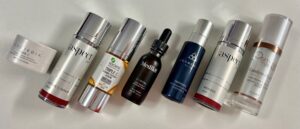
This week it is all about Vitamin C, one of the most important serums to add to your skin care routine. Here we talk about what it is and why you’ll love it.
What is Vitamin C skin care?
Vitamin C is the most important Antioxidant to combat UV damage in your skin. However, it actually does so much more…
This amazing, well-proven ingredient is an essential part of anyone’s routine who wants to create a healthier, better-looking skin that ages incredibly slowly. Isn’t that what we all wish for?!
The Action of Vitamin C in Your Skin
- Is essential for the action of many other vitamins in the skin to occur.
- Repairs the redness from too-long exposure to the sun.
- Slows sunburn cell formation whilst in the sun and minimises UV damage in the skin when applied soon after exposure.
- The formation of pigment is slowed (brown spots) by inhibiting the enzyme tyrosinase.
- Stimulates collagen and elastin production – slows wrinkle formation.
- Fights free radicals (damaged cells) and is, therefore, anti-ageing.
- Gives a brightening effect to the skin by removing dullness.
- Decreases cellular inflammation – helps fight photo-ageing (sun damage).
It is easy to see why topical Vitamin C is an essential part of your skin care regime, not just so you look great, but so your skin is healthier! A healthier, thicker skin that shows fewer capillaries, is smoother, more even-toned and simply feels and looks younger.
How to Use Vitamin C Skin Care

Generally, it’s recommended that your serum is applied every morning, with your other super antioxidant, Vitamin A serum applied at night. However, after a day or any period of time in the sun and therefore any UV exposure, also applying it liberally after cleansing will assist your skin to recover and minimise any damage you may have done. Apply it directly to clean skin under your daily sun block for best effect.
Some Facts About Vitamin C and Your Skin
- It doesn’t matter how much Vitamin C we eat, only a small amount will reach our skin. Oral Vitamin C has an inadequate gut/skin transport system and, as the body cannot make its own, we do need to eat it, but this also means that we MUST apply it topically in the form of a serum to our skin – if we want it working in our skin.
- The body doesn’t store it very effectively either, which means every day we do need to both eat more and apply it topically onto our skin.
- Once in the skin, it loses efficacy when exposed to UV. However, it also protects the skin from the ageing effects of UV exposure by neutralising free radicals and slowing the cascading effect of their formation.
- Vitamin C is water-soluble and so finds it very difficult to penetrate the skin. It is also quite unstable and loses its “goodness” very quickly when exposed to air and light. To overcome these problems, Vitamin C serums need to be either in dark bottles or in a crystalline form which are then mixed with serums.
Keep your Vitamin C serums out of the sun where possible.
- Manufacturers formulate it in various ways to help it be more stable and to improve its ability to penetrate the skin. What you should read on packaging are words such as L-ascorbic acid, esterified Vitamin C, ascorbyl-6-palmitate, magnesium ascorbyl phosphate.
- Although there are more, these ones should all be stable for you as well as able to penetrate, so smile if they are in your cupboard, but also check that there are no SLS’s, parabens or other nasties. That way you know you have a perfect product!
- The % of Vitamin C is not so important; it is more relevant that you apply it to your skin at least once a day. Differing % of the Vitamin actually work differently in your skin, so you benefit either way.
- By combining a Vitamin C serum with Vitamin E, Zinc and other plant-based antioxidants, such as Ferulic Acid, its efficacy can be increased by up to 20 times.
A Bit About UV Protection
Vitamin C does not absorb UV light and so is equally effective against both UVB and UVA in the skin.
-
- UVA changes and destroys skin cells, including collagen, elastin and other structures in the dermis. Therefore, it causes ageing and possible melanoma formation.
- UVB causes you to turn red and be sunburnt, creates free radicals and possible skin cancers.
- It has been shown that when Vitamin C is added to a sunscreen or applied directly to the skin prior to any sun exposure, there will be reduced sunburn and, therefore a reduced ageing effect in the skin.

Which Vitamin C is best for your skin?
You’ll actually find that many, if not almost all of our products contain Vitamin C, it is so essential for healthy skin. However, some serums are focussed on giving you the best:
- Normal Skin: Our best selling options are Aspect Dr Active C Serum, SkinCeuticals CE Ferulic and Medik8 C-Tetra. Another brilliant option is CosMedix Pure C Mixing Crystals which provides a high dose of Vitamin C and can be added to any antioxidant serum or moisturiser. It’s an easy way to provide Vitamin C to your skin care routine.
- Ageing Skin 35+: CosMedix Affirm, Societe Triple C Vitamin Therapy, SkinCeuticals Phloretin CF or CosMedix Elite Pepoxide.
- Pigmentation & Sun Damage: Osmosis MD Catalyst AC11, SkinCeuticals Phloretin CF, as well as the perfect pairing of CosMedix Pure C and Simply Brilliant, mix together to combat past sun damage.
- Sensitive, Dry & Red Skin: Aspect Dr Redless
- Young Skin 18+: Aspect Extreme C
- Acne Skin: SkinCeuticals Silymarin CF
Want even more Vitamin C in your routine? Medik8 have included this amazing ingredient into some of their daily moisturisers: Medik8 C-Tetra Cream and Daily Radiance Vitamin C.
And for a super-duper boost, why not pop into the clinic and have a Vitamin C treatment peel. Especially good before a special occasion, this treatment will have you looking fresh and glowy.
And if you need any more assistance in choosing your skin care, you can email us at info@theskincareclinic.com.au.

Our Best Vitamin C Skin Care Serums, Creams and Powders.
Normal Skin
-

Aspect Dr Active C Serum
Original price was: $149.00 – $298.00.$149.00 – $268.00Current price is: $149.00 – $268.00. Select options This product has multiple variants. The options may be chosen on the product page -

SkinCeuticals C E Ferulic
$242.00 Add to cart -

Medik8 Daily Radiance Vitamin C
Original price was: $118.00 – $209.70.$118.00 – $186.40Current price is: $118.00 – $186.40. Select options This product has multiple variants. The options may be chosen on the product page -

Medik8 C-Tetra Serum
$86.00 Select options This product has multiple variants. The options may be chosen on the product page -

CosMedix Pure C Mixing Crystals
$99.00 Add to cart
Ageing Skin
Pigmented Skin
-

Osmosis Catalyst DNA Repair C Serum
$253.00 Add to cart -

CosMedix Simply Brilliant Brightening Serum
Original price was: $119.00 – $196.00.$119.00 – $174.40Current price is: $119.00 – $174.40. Select options This product has multiple variants. The options may be chosen on the product page -

CosMedix Pure C Mixing Crystals
$99.00 Add to cart -

SkinCeuticals Phloretin CF Serum
$242.00 Add to cart
Dry / Sensitive Skin
Young Skin
Acne Skin
Still not sure?
Do you need more help or would like personalised advice? Book now for your consultation with a skin care advisor. Offering information on what skin care products are best for you. Check out our range of in-clinic services today.
Otherwise fill in the Online Skin Consultation. Our skin care advisor will happily help you. Choosing the right treatments and products for your skin type or concern.
Check out our latest Specials!

















Leave a Reply